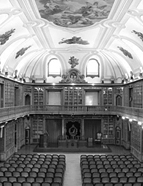

As stated by T. Soares in around 1950, referring to Fustel de Coulanges and repeating what the previous generation had already stated in Coimbra, History «consists of nothing but verifying the facts, analysing them, approximating them and marking their place». But he naturally recognised a spirit of synthesis in Fustel de Coulanges, that is, «a philosophical conception of History, namely the History of Institutions», which he did not find in other authors, such as G. Barros (História da administração [History of administration], Volume I, 1945, p. XI). It should be noted that the doctoral programme in Historical and Geographical Sciences for 1917-1918 included themes such as «the notion of historical fact and the criteria for its determination», besides other problems that pointed clearly to a "theory" of History.
The influence of this paradigm is reinforced through the model of German historicism. The «detailed narration», the «rigorous exposition of facts, however conditioned and lacking in beauty they may be», had been established by Leopold von Ranke (1795-1886) back in 1824, as the «supreme law of the historian» (J. J. Carreras Ares, Razón de Historia, 2000, p. 222). Furthermore, the German school generally influenced the professional historians of the time, and in particular the Portuguese, through the development of cultural relations with Germany from at least 1923 onwards. Thus, for example, in 1927-1929, M. Lopes de Almeida was Reader of Portuguese in Hamburg and, from 1925 to 1928, Mário Brandão performed similar duties in Hamburg and Berlin, as was the case with other future teachers of the Faculty. This cultural policy of readers and missions abroad, supported by the Junta de Educação Nacional [National Education Board] (1929-1936) and covering the whole country, was bound to have consequences.
However, the model initially assumed by the History Cluster had its contradictors at birth. In Germany, the foundations of History's scientism had been under attack since 1870 (Diltey, Simmel and Rickert), and in Portugal there was also a reaction to the positive-scientist ideology, which went on to impose itself in Literature, History, Law and Philosophy.
Paulo Merêa and Cabral de Moncada, History of Portugal teachers at the Faculdade de Letras, would fight for an idealism in History (Merêa, from 1910), and Gonçalves Cerejeira, in around 1923-1924, would also rise up and fight against the positivist paradigm.
